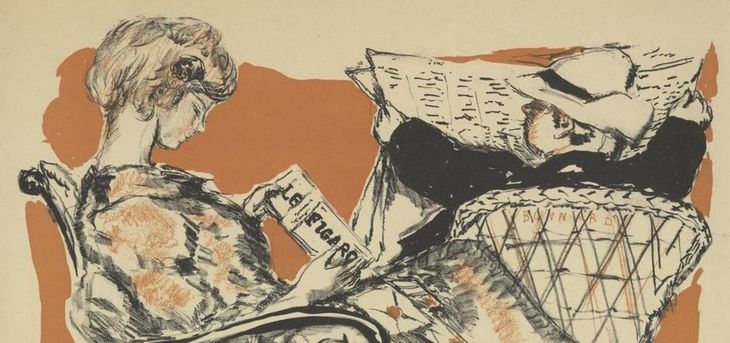Blog posts are written by project team members. Topics range from conferences we attend, musings on current affairs of relevance, internal project findings and news and more succinct content which can be found in our Digital Humanities Case studies or project related publications. Blog posts will mainly be posted in English but will from time to time feature in the language of the project team member’s preference, since we are a multilingual bunch! Happy reading!
The Representation of Women in Digitised Historical Newspapers: A Seminar at the National Library of France

On the 15th of March 2021, an academic seminar on the theme of ‘The Representation of Women in Digitised Historical Newspapers’ (À la recherche des femmes dans la presse ancienne numérisée) was held at the National Library of France (BnF). Focusing on the period of 1850 to 1950, this event was held entirely in French and with the absence of a live audience due to restrictions regarding the Coronavirus pandemic.
Organised collaboratively by NewsEye colleagues from the three French project partners, La Rochelle Université, Université Paul Valéry - Montpellier 3 and the Bibliothèque nationale de France, this event was divided into five distinct sections:
- Presenting the NewsEye Project
- Feminine Journalism: The Historical Challenges of Digital Technology
- The Press and Feminism at the BnF
- Digital Tools and Research about Feminism
- Round Table Discussion: Perspectives on the Challenges and Issues of Making Large Digitised Corpora Available
The entirety of the seminar recordings are available to watch on the BnF's YouTube channel below and the thematic video collections from the day can also be consulted on the BnF's website.
How can we understand and carry out research using digitised historical newspapers corpora? Throughout the day, several possible answers were provided thanks to the presentation of research related to the theme of women in digitised historical newspapers and by the demonstration of several tools: Gallica, RetroNews, and a new online research tool developed by NewsEye. This article aims to explain which themes were discussed for our non-French speaking audience.
Presenting the NewsEye Project
- The day began with an introduction by Bruno Sagna, Interim Head of International Engagement at the BnF, who contextualised the NewsEye project within the institution’s efforts regarding the digitisation of its massive newspaper collection, as well as its contributions to digital research and EU-funded projects.
- This was followed by an introduction to the project carried out by Project Coordinator and Full Professor Antoine Doucet (La Rochelle Université).
- Research Engineer Axel Jean-Caurant (La Rochelle Université), who has worked on the project since its inception in 2018, followed this with a demonstration of the NewsEye Platform and its various innovative functions. The platform is open to registered users and can be accessed in English, French, Finnish and German.
Feminine Journalism: The Historical Challenges of Digital Technology
- The second session of the day began with Marie-Ève Thérenty, who is a Professor of French Literature at Université Paul Valéry - Montpellier 3, and her presentation 'Proposals for a New History of Women Journalists: The Important Place of Digital Technology'.
- This was followed by the presentation of Christine Bard, Professor of Modern History at the University of Angers, on the theme of 'The FemEnRev Project: From Digitisation to the History of the Post-World War II Feminist Press'. This presentation also featured the contribution of Magali Guaresi, a Postdoctoral Researcher at the Université Libre de Bruxelles.
The Press and Feminism at the BnF
Following a much-needed lunch break, the day resumed with presentations regarding the digitised press collections of the BnF.
- Hélène Raymond, Deputy Director of the library's Law, Economics and Politics Department, showed how these precious collections can be openly accessed via the BnF's digital library, Gallica.
- Likewise, Étienne Manchette, Partnerships and Content Manager at BnF-Partenariats, presented RetroNews, a platform dedicated to the historical printed press collections of the BnF.
Digital Tools and Research about Feminism
This session was followed by the presentations of Claire Blandin, Professor of Information Science and Communication at Université Sorbonne Paris Nord, and Nejma Omari, PhD Student in French Literature at Université Paul Valéry - Montpellier 3.
- Claire Blandin's presentation, 'The Noise of Data against the Silence of History: Towards a New Interpretation of the First-wave Feminism', can be accessed on the BnF's website here.
- Furthermore, Nejma Omari's presentation, 'The Everyday Life of Pants-Wearing Women: Mediatic Farce and Digital Humanities', can be accessed on the BnF's website here.
Round Table Discussion: 'Perspectives on the Challenges and Issues of Making Large Digitised Corpora Available'
The intellectually fruitful day continued with presentations by Cyrille Suire (a researcher and teacher at La Rochelle Université and the University of Versailles Saint-Quentin-en-Yvelines), Pierre-Carl Langlais (a researcher in the fields of Information Science, Communication and Digital Humanities) and Jean-Philippe Moreux (Gallica Scientific Expert at the National Library of France).
- Cyrille Suire's presentation focused on the theme of 'Understanding the Uses of Digitised Corpora: Approaches Based on the Analysis of Digital Traces'.
- Pierre-Carl Langlais's presentation 'The Optics of Distant Reading: From the Concealment to the Deconstruction of the Archive' concentrated on his work accomplished within the Numapresse project, which focuses on research using French-language digitised historical newspapers.
- Jean-Philippe Moreux's presentation 'Working on Digital Corpora: From Collections to Researchers' elaborated on the opportunities for digital research using the corpora conserved by the BnF
The day ended with a round table discussion moderated by Emmanuelle Bermès, Deputy Director for Services and Networks in Charge of Technical and Scientific Matters at the BnF, which focused on both the state of play and the possibility for future innovations in the field of digitised corpora accessibility.